Find the best-performing Dividend Aristocrats in industries such as finance, healthcare, materials, and energy
In the middle of ongoing market uncertainty, a small subset of businesses is known as the Dividend Aristocrats, which have raised their dividends consistently, at least in the last 25 years. These companies continue to be solid, reliable, and growing. These prestigious organizations have steadfast dedication to maximizing value. They provide investors with optimism for their portfolios by providing stability, durability, and profits.
Imagine investments as strategic alliances with businesses that have endured hardships and become stronger each year rather than just speculative bets. This is the pledge made by the Dividend Aristocrats, supported by years of demonstrated success and an unrelenting commitment to the interests of shareholders.
Read more to travel through the halls of corporate greatness in this in-depth investigation, revealing the trade secrets of seven such Dividend Aristocrats from a variety of industries. These businesses are pillars of stability and expansion in their respective industries, from the busy aisles of healthcare to the tall buildings of real estate, and the complex networks of industrials to the energy-dense deposits of oil and gas.
Dividend Aristocrats: Walgreens Boots Alliance (WBA)
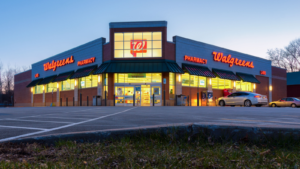
Source: Mahmoud Suhail / Shutterstock.com
Walgreens Boots Alliance (NASDAQ:WBA) offers a 4.7% dividend yield (forward). The company’s U.S. healthcare segment holds considerable year-over-year (YOY) profit improvement. Here, adjusted EBITDA increased by $84 million (Q1 fiscal 2024) against Q1 2023. Notably, VillageMD achieved a 14% growth in sales, leading to a consolidated improvement in the healthcare segment’s profitability.
Furthermore, Shields’ sales were boosted by 27%. This is based on new health system contracts and expanding existing partnerships. Notably, Walgreens Boots Alliance can attain a 10% boost in consolidated sales in adverse retail environments.
Fundamentally, the correlation between profit improvement and segment performance reflects the sharpness of initiatives that optimize operations and boost profitability. VillageMD and Shields’ sales growth reflects the company’s success in expanding its healthcare service offerings and capitalizing on opportunities in the healthcare market.
Overall, these positive trends validate the company’s healthcare expansion initiatives. Hence, this indicates the company’s edge in driving growth and advancement in the healthcare sector.
3M (MMM)
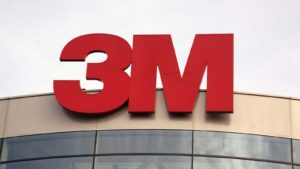
Source: JPstock / Shutterstock.com
3M’s (NYSE:MMM) is attached with a 6.1% forward dividend yield. The company implemented considerable restructuring actions in 2023. These actions have resulted in more than $400 million in savings, and these restructuring efforts continue to lead to margin expansion and boost operational efficiency.
On the other hand, 3M holds the fundamental capacity to derive solid cash flow. For instance, in Q4 2023, operating cash flow hit $2.0 billion (+3% YOY). Similarly, adjusted free cash flow increased significantly, +18% YOY (to $2.0 billion).
Despite economic challenges, 3M continued its focus on returning $828 million through dividends in the fourth quarter of 2023. Additionally, 3M reduced net debt by $2 billion, or 17% YOY, indicating a solid balance sheet and high discipline.
Overall, the company can derive strong cash flows, reduce debt, and provide a consistent return on value to boost its financial stability. This financial solidity positions 3M for a leap based on growth initiatives. Thus, these moves include investments in high-growth markets and strategic acquisitions.
Dividend Aristocrats: Realty Income (O)
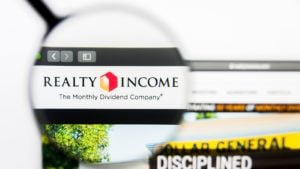
Source: Shutterstock
Realty Income (NYSE:O) yields 5.8% (based on a forward dividend). The REIT maintains high portfolio occupancy, which reflects the quality of Realty Income’s assets and the stability of its topline. Notably, portfolio occupancy stood at 98.6% at 2023’s end, which indicates strong tenant demand and effective lease management.
Furthermore, positive rent growth demonstrates the company’s capability to attain value from its properties and derive organic topline growth. Same-store rent grew by 2.6% in Q4 2023 and 1.9% for the year. This indicates healthy property performance and lease renewals.
Moreover, proactive asset management boosts property performance and minimizes risks. Here, attaining a recapture rate of 103.6% during Q4 and 104.1% for 2023 suggests Realty Income’s sharpness in replacing vacated properties and optimizing portfolios.
Finally, the REIT’s high financial management supports the company’s long-term sustainability. The company maintains a fixed charge coverage ratio of 4.7x and a net debt to annualized pro forma EBITDA ratio of 5.5x. Therefore, this points out Realty Income’s focus on discipline and risk management.
Amcor (AMCR)

Source: shutterstock.com/zedspider
Amcor (NYSE:AMCR) holds a dividend yield of 5.3% in forward terms. The company holds several core competencies that underpin its potential for quick value growth. Amcor has demonstrated substantial financial success, as seen by its adjusted earnings before interest and taxes (EBIT) and earnings per share (EPS).
Despite challenging market circumstances, Amcor announced GAAP diluted EPS of 9.2 cps and adjusted EPS of 15.7 cps for the Dec. 20, 2023 quarter. The company derived an adjusted EBIT of $709 million and adjusted EPS of 31.3 cents for H2 2023.
Furthermore, Amcor continues to hold a lead position in its markets. This is demonstrated by its presence on several continents, including Europe, Asia, Latin America, and North America. Despite declining volumes in several categories, Amcor is still well-represented in the market. For instance, the corporation experienced growth in categories including confectionary, snacks, and condiments in North America despite a reduction in overall beverage volumes.
Dividend Aristocrats: Chevron (CVX)
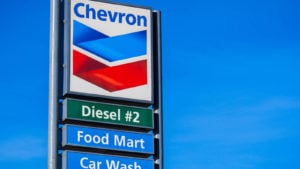
Source: Sundry Photography / Shutterstock.com
Chevron’s (NYSE:CVX) dividend yield (forward) stands at 4.3%. The company’s financials show a sharp approach to debt management and capital expenditures, which increased 32% over 2022. The company maintains a stable balance sheet and a reasonable debt profile.
Fundamentally, the company has solid capacity to pay off its debt, which totals roughly $4 billion and includes all debt acquired via acquisitions in 2023. This suggests the company has systematic debt management strategies. Chevron has proven its solid financial standing and stability in a challenging operating climate, as evidenced by its 7.3% net debt ratio.
Finally, Chevron’s dividend policy and share repurchase plans are outstanding examples of the company’s focus on delivering value. The quarterly dividend will increase 8% to $1.63 per share in 2023. This suggests insiders’ bullish stance on the company’s potential for cash flow generation and rapid expansion. Overall, Chevron focuses on boosting its valuation over the long run.
Franklin Resources (BEN)
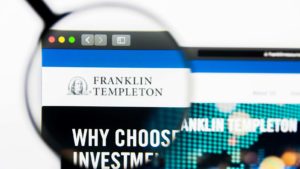
Source: Pavel Kapysh / Shutterstock.com
Franklin Resources (NYSE:BEN) reports strong client interest in private market strategies, resulting in net inflows for its three largest alternative managers and a forward dividend yield of 4.5%. Remarkably, Benefit Street Partners raised more money than expected for its flagship private credit fund, demonstrating the high demand for this investment.
In Q1 2024, the business raised almost $5 billion in the private markets. Notable contributors included flagship funds such as Benefit Street Partners’ fifth flagship private credit fund ($4.7 billion) and Lexington Partners’ global secondary fund ($22.7 billion). These successful fundraising efforts bolster investor trust in Franklin Resources’ alternative investment products.
Lastly, Franklin Resources drives fundraising success by utilizing its well-coordinated worldwide distribution network, especially in the wealth management channel. The wealth management channel accounted for almost 20% of the capital collected for Lexington Partners’ fund, demonstrating the success of the business’s plan.
T. Rowe Price (TROW)
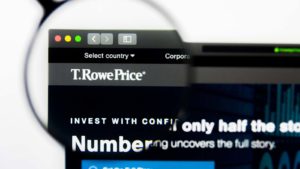
Source: Pavel Kapysh / Shutterstock.com
The forward dividend yield on T. Rowe Price (NASDAQ:TROW) is 4.2%. The company focuses on increasing its market share outside the U.S., namely in Asia Pacific (APAC), Europe, the Middle East, and Africa (EMEA). Favorably, positive market dynamics in APAC and EMEA support the company’s outlook, with anticipated substantial growth in these regions compared to the U.S.
At its core, the business offers customized goods and services to satisfy the various demands of customers worldwide. The company’s competitive edge is strengthened by introducing new products such as OCREDIT and the T. Rowe Price Emerging Markets Blue Economy Bond Strategy, which address particular market demands.
Fundamentally, T. Rowe Price has demonstrated robust investing success in several asset types. In 2023, 64% of its funds fared better than the year-end medians of their peer groups. Overall, under David Giroux’s management, the Capital Appreciation Fund tied a record by achieving top-quartile performance for 16 straight years.
As of this writing, Yiannis Zourmpanos held a long position in MMM. The opinions expressed in this article are those of the writer, subject to the InvestorPlace.com Publishing Guidelines.

